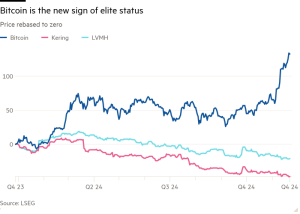Italy’s single women fight for the right to IVF
Unlock the Editor’s Digest for free
Roula Khalaf, Editor of the FT, selects her favourite stories in this weekly newsletter.
Evita, an Italian human resources professional, always expected to have a traditional family. But on hitting 40 and with no suitable partner in sight, she realised that fulfilling her dream of motherhood would mean going it alone.
“I have always loved children; in my mind, I would like to have a family with a husband and a lot of children,” she says. “But there is a moment in your life when you have to decide what you want, and what you will be.”
In a country with a rapidly-ageing population, one of the world’s lowest fertility rates, and a steady decline in annual births, every woman ready to embrace the challenges of parenthood should be cause for celebration.
Not in Italy. Enthralled by idealised traditional families, the Italian government only permits heterosexual, married women to undergo in vitro fertilisation, even in private clinics. Single women or those in same-sex partnerships are denied access to IVF, forcing them to go elsewhere — typically Spain or the UK — for treatment.
In her own quest to conceive, Evita — who asked that her full name not be used — has not followed that well-trodden path. She is instead fighting for assisted reproductive technology at home. With support from the Luca Coscioni Association (ALC), which works on human rights in medical care and scientific research, she has filed a court petition arguing that denying IVF to single women violates Italy’s constitution, and the European Human Rights Convention. Another woman — an unmarried 36-year-old, financially stable and longing for a child — has also joined the case.
Last month, a court in Florence (where Evita sought IVF at a private clinic) agreed the women’s claim has merit and that Italy’s IVF restrictions may violate constitutional rights to equality, health, self-determination and the freedom to start a family.
Now, Italy’s constitutional court is set to consider the issue in proceedings that will be closely watched — including by some Italian women who had a baby through IVF abroad but would like a second child if possible closer to home.
Evita is optimistic, convinced that Italy’s current law on assisted reproduction — adopted two decades ago during the late former prime minister Silvio Berlusconi’s government — is seriously out of sync with contemporary Italian society, and ripe for an overhaul.
“People are favourable and supportive — it’s difficult to find a person who is against the principle of single mothers,” she said. “Italy needs a shock. The law is not keeping up with the times in which we are living. People are struggling to create a family.”
Plenty of children in Italy are already raised outside traditional family settings. Between 2015 and 2021, 211,878 couples with dependent children divorced. Ever more babies are born out of wedlock. In 2022, the latest year for which data is available, 163,317 babies were born “outside marriage” in Italy — nearly 42 per cent of all births that year.
Prime Minister Giorgia Meloni is one of many Italians whose personal life has followed an unorthodox path. Raised by a single mother, Meloni was not married to her then partner when their daughter, now eight, was born. Last year, the premier announced that her decade-long relationship with her daughter’s father was in effect over.
Politically, though, Meloni still pays homage to tradition — asserting children’s right to have both a mother and a father — while bemoaning Italy’s deepening demographic crisis, with the working age population expected to shrink by an estimated 19 per cent by 2040.
No lone measure can reverse these alarming demographic trends. But given Italy’s desperation for children, removing obstacles from women aspiring to be mothers, regardless of their marital status, is just common sense.
Filomena Gallo, who leads the ALC legal team, hopes the constitutional court will have the courage to change what Meloni’s ultra-conservative government won’t.
“We talk about family, about encouraging more births,” Gallo said. “A woman can have a fling, get pregnant and decide to keep the baby. But if that same woman wants to seek IVF, she is discriminated against.”
#Italys #single #women #fight #IVF




